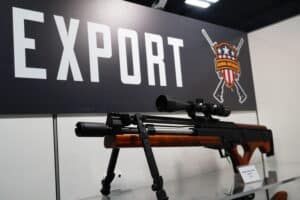Prominent Democrats want the Biden Administration to continue blocking gun exports, while Republicans attacked the plan to replace the total ban.
On Tuesday, four Democratic congressional leaders wrote a letter to the Commerce Department asking it to extend the 90-day pause on firearms exports. Senators Dick Durbin (D., Ill.) and Elizabeth Warren (D., Mass.) teamed with Representatives Joaquin Castro (D., Texas 20) and Norma Torres (D., Calif. 35) to urge Secretary Gina Raimondo to keep the ban in place past its potential expiration on Thursday. It also recommended a slew of new restrictions Commerce should adopt before lifting the ban.
“Clearly, a brief 90-day pause in export license approvals and promotion is insufficient to address the breadth of the problem,” the letter said. “Before it ends this pause, Commerce must make significant changes to its export license approval and monitoring policies.”
The letter did not mention the draft proposal for a permanent replacement to the pause that The Reload published late last month. However, many of the changes the Democrats proposed were included in the leaked rule. For instance, the requirement that exporters obtain identification documents from end buyers and increased scrutiny on sales to Israeli civilians are included in both documents.
For their part, several Republican elected officials took aim at the leaked proposal. Congressman Richard Hudson (R., N.C. 8), who sits on the committee overseeing the Commerce Department, said the move would harm American businesses.
“This is just another attack against the Second Amendment by the Biden Administration,” he told The Reload. “Restricting firearm exports will crush American businesses, and they deserve answers.”
Senator Tedd Budd, who sits on the Commerce Committee, called the draft proposal “highly burdensome.” He said Secretary Raimondo has yet to respond to a letter he and 25 other Republican Senators sent her decrying the export pause.
“I am very concerned with the Department of Commerce’s draft policy on civilian firearms exports,” Senator Budd told The Reload. “I continue to urge Commerce to provide specific reasons for its proposed changes and to explain their impact on our nation’s security and our economic interests, such as this highly burdensome requirement that U.S. exporters collect the passport or other identifying information of foreign buyers of civilian firearms.”
The Department of Commerce said it is engaging in discussions with lawmakers and others as it considers what to do once the export pause ends. It also noted the announcement of the pause said it was set to last “approximately” 90 days, which means it won’t necessarily expire on Thursday.
“The Department paused the issuance of new export licenses involving certain firearms, related components, and ammunition under its jurisdiction and the provision of new export assistance activities for such products to non-governmental end users in certain destinations,” a department spokesperson told The Reload. “Since the pause, the Department has engaged with lawmakers and other stakeholders. Those discussions are ongoing and are not indicative of any preliminary or final determinations by the Department.”
If Commerce extends the pause, it would likely cause significant losses for American gun companies. If it enacts the draft proposal, those losses would probably become permanent. The proposed restrictions could also impact foreign affairs as the pause exempts allies in global hotspots like Ukraine and Israel while the draft restrictions do not.
Commerce has previously said there haven’t been any decisions on whether civilian gun exports to those nations will be affected by the final rule.
“No decisions on potential policy changes resulting from the review have been made,” a Commerce Department spokesperson told The Reload last month. “The U.S. government is closely engaged with Israeli and Ukrainian counterparts and will continue to support U.S. allies’ ability to defend themselves. That is why the pause specifically exempted non-governmental end users in Ukraine and Israel from its scope.”
The Democrats argued Commerce should extend the pause and adopt strict new export rules because they believe American gun makers are responsible for overseas killings.
“As more and more firearms have left American shores, their impact in other countries has worsened,” they wrote. “Reports abound of U.S.-manufactured weapons being used in horrific killings across the globe.”
The four Democrats pointed specifically to Israel as a country where American gun exports for civilian use should be heavily restricted–something the draft proposal does.
“There is also evidence to suggest that soldiers and civilian militias in Israel are using American-made semiautomatic weapons to perpetrate shocking violence against Palestinian civilians,” they wrote. “The risks to civilians likely only increased after the Israeli government loosened gun ownership requirements and authorized ‘temporary licensing official[s]’ with only a single day of training to approve ‘anywhere from hundreds to thousands of firearm licenses’ over a few weeks.”
The letter also attacked Commerce over its working relationship with the gun industry, including during its annual trade show that is happening in Las Vegas this week.
“Since 2014, Commerce has worked directly with the National Shooting Sports Foundation (NSSF) and other gun industry mainstays to court foreign buyers of U.S. weapons,” the Democrats wrote. “Reports indicate that Commerce officials and staff coordinate closely with the domestic gun industry to attract potential foreign customers to the annual Shooting, Hunting and Outdoor Trade Show (SHOT Show), which generates 75 percent of the NSSF’s revenue.”
They framed the Commerce Department working with American gun companies as an affront to the Biden Administration’s gun-control priorities.
“Despite the Biden Administration’s efforts to stem the tide of gun violence at home, Commerce continues to actively participate in firearms export promotion activities like the SHOT Show,” they said.
The four elected officials called on Commerce to stop attending the conference altogether.






Only Members can view comments. Become a member today to join the conversation.